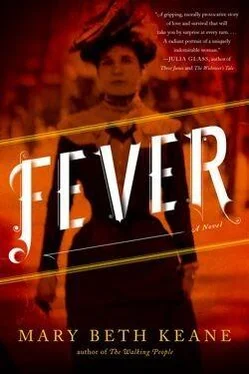In the beginning, Mary would meet Alfred for regular Wednesday and Saturday evenings out. One Wednesday, he told her that he wanted to live with her, and also told her that he knew she wanted to live with him. So when Saturday came, he called on her earlier than usual and said that he’d found a flat on Thirty-Third Street. Would she come see it? To decide? He’d promised the landlord they’d let him know by the end of the day. Mary went with him and they walked along Third Avenue with Alfred making his case the whole time. He’d known her so well that he’d gone up earlier that morning to place in that gray and narrow kitchen a single hothouse orchid in a red clay pot so that the first thing she would see when she pushed open the door was something beautiful that needed tending. Needed her tending. And she’d said, in halfhearted protest, because she felt herself giving in, felt that she’d given in already, “But we aren’t married,” and he’d looked at her for a long time before asking, “What has that to do with anything?”
• • •
The special ferry that would transport her over to 138th Street was due at eight o’clock in the morning. That would give her time to get across the East River and all the way downtown to the courthouse by ten o’clock. She’d been preparing for two days, scrubbing each of her three blouses and hanging them outside in the sun, brushing each of her skirts. In twenty-seven months the two white blouses had gone a bit yellow, the ruffles fallen flat. Two of the wool skirts had gone shiny at the seat and to her shame, when she had them out in the sun and could look at them more closely, she thought she could make out a separation in the worn area of each, two moons next to each other and a narrow space in between. The nurses offered her clothing from the hospital, told her to help herself before they were sent to the mainland and donated, but she didn’t want those tubercular blouses and dresses, didn’t want dead women’s hand-me-downs. Besides, she had difficulty finding blouses that weren’t tight across the bust, and how dare they, anyway, assume she’d wear any old thing they offered, no matter what state it was in, how crooked the seams, how flimsy the lining, no matter who’d worn it before her and what kind of tailoring that person had paid for, and what quality of cloth. How dare they? She was no beggar. She was a cook and had earned good wages and she wouldn’t touch any of it.
“There’s many who’d be grateful, ma’am,” one nurse commented when Mary told her to take it all away, and she realized too late that they were only trying to be kind. They retreated from Mary’s cottage like it was on fire, and a moment later she watched their work-whites fade into the shadow cast by the main building of the hospital. She told herself to shout after them that she was sorry, that they must try to understand.
• • •
The afternoon before the hearing, when she picked out the best of her blouses and the best of her skirts, she asked John Cane to fetch an iron and board from the hospital laundry. “Just give them here and I’ll tell them to do it,” he said, and held open his arms for the clothes.
“I don’t want them to do it,” Mary said slowly. “I want you to fetch me an iron and board so I can do it myself.”
“You don’t even trust them to iron a shirt?”
“Please, John,” Mary said before she closed the door. After an hour, she went out and looked at the small side door of the hospital where he usually came and went. She waited two more hours. She spotted him coming around six o’clock, but it was only to bring her dinner, and he promised to come back again. At ten o’clock that night, long after he would have taken the boat back to the mainland, Mary went outside one last time in her bare feet to see if anyone was making his or her way along the footpath, but all was silent except for the distant bell of a trolley across the river. At midnight, she boiled a small amount of water in a saucepan and did what she could with the smooth cast-iron bottom, pushing it along the sleeves of her best blouse. When she was finished, the blouse hung neatly over a chair, the skirt flat on the table like a tablecloth, she climbed into her cot. She tried to imagine something peaceful that would put her to sleep, but instead, her left eye began to twitch. She squeezed both eyes shut, but she could feel it still, the muscle fluttering against her palm where she pressed it as hard as she could. The last thought she had was of Alfred, and how she’d have to explain to him why she had to keep one hand over her left eye.
When she woke, and dressed, and made herself a cup of black tea, she opened the front door of her cottage to find John Cane placing the twelve-pound iron on her front step. “And what should I do with it now? It’ll take an hour to warm up.”
He held up his hands as if to say it wasn’t his fault. Nothing was his fault.
She wasn’t going to argue with him that day. She’d save any arguing for the judge downtown.
“You look nice anyhow,” John said, and Mary’s hand went to her throat. She wished she had a brooch. “Good luck today.”
“I mightn’t be seeing you again, John. If I don’t see you, I wish you all the best.” She clasped her hands together and nodded at him. “You were kind to me.”
“But surely they won’t let you go today, will they? They’d need to see you a few times more?”
“Mr. O’Neill said maybe today.” He also said the judge had probably made up his mind long before he stepped into the courtroom. Judges were supposed to be as cold and accurate as scales with the weight of proof added equally to each side, but Mr. O’Neill said they often stepped into the courtroom with the scales already tipped.
“Oh, I’ll see you later, Mary. I’m not worried.”
“You’re supposed to hope you won’t see me later.”
“Well, now.”
“What do you mean? It’s like wishing me bad luck. Do you wish me bad luck?”
“Not a bit! And I’ll bring a bit extra for your dinner tonight. You’ll be starved after all that traveling.”
Mary felt the twitch start up again and pressed her hand to her eye before it became too strong to stop.
• • •
For the short journey from North Brother Island to the mainland, she folded two small squares of paper over the sharp points of her collar so they wouldn’t be soiled in transit. She kept her tie — blue, flecked with black — folded in her pocket until she arrived downtown. She’d known that the journey across the East River would be choppy, and that the ferry would create its own breeze by its speed, so she’d waited to pin her hair until she was escorted onto the pier at 138th Street. “Excuse me,” she’d said to her guard, a young man, eighteen, perhaps, twenty at most, and before he could answer she strode off toward the small one-room depot and the door marked Ladies. He’d performed his duty well enough, stepping down into the boat ahead of her like any gentleman in case she should stumble, and up onto the dock when they reached the city. But he didn’t offer his arm, and during the crossing — the nose of the boat rising to meet each roll of gun gray water before falling, rising, falling, the two passengers and one crewman jostling side to side on the long bench seat — he’d kept his face turned away from hers and clutched the railing that rimmed the edge of the boat so that he wouldn’t brush against her during the passage. When she tried to speak to him, placing her face close to his so he could hear her over the sound of the slapping waves and the roar of the boat’s engine, he’d grimaced.
Once inside the narrow lavatory she took two long hairpins from her handbag and held them in her mouth as she twisted and tucked her strawberry blond hair into an arrangement at the back of her neck. The mirror she was accustomed to looking at every day since 1907 was merciless; it was placed near the single window in her cottage and faced north. This lavatory mirror was shadowed and freckled, and Mary examined her face carefully in the forgiving light. Some of the newspapers had included images of her with sharpened features. Others had drawn her fat and aged, cracking human skulls in a skillet like they were eggs, with a bosom that should have tipped her over. To herself, the morning of the hearing, she looked like she always had — pretty, but not unusually so. Clean. Efficient. Ready for work. In different clothes, and a different accent, and with hands that had not spent the better part of twenty years in scalding water, she might have been mistaken for a lady. She’d often been told she was haughty enough.
Читать дальше












